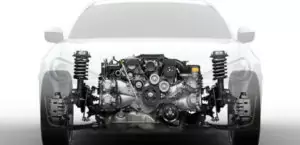The 1.5-liter diesel engine Hyundai D4FA or 1.5 CRDi was produced from 2005 to 2011 and was installed on such popular models of the company as Accent, Rio, Matrix, Getz or Cerato. In addition to the standard version of such a unit, there were modifications of reduced power.
At the very end of 2004, a 1.5-liter U-series diesel debuted at the Hyundai Matrix. The first version with a capacity of 102 hp was equipped with a CR Bosch CRS1 with an injection pressure of 1350 bar, and in addition to the Matrix, this EURO 3 unit was installed on the Kia Cerato from 2005 to 2006. Already in 2005, a EURO 4 engine with a Bosch CRS2 Common Rail system for 1600 bar appeared and, in addition to the standard modification for 110 hp / 235 Nm, it had reduced power versions: Getz was equipped with an 88 hp / 215 Nm engine, and Kia Rio was equipped with a 79 hp / 170 Nm unit.
By design, this is a classic diesel engine for that time with a Common Rail fuel system, a cast-iron block and an aluminum 16-valve cylinder head with hydraulic lifters, a timing chain, a Garrett GT1544V variable geometry turbine, and swirl flaps in the intake.
The Hyundai U family also includes engines: D3FA, D4FB, D4FC, D4FD and D4FE.
The engine was installed on:
- Hyundai Getz 1 (TB) in 2005 – 2009;
- Hyundai Accent 3 (MC) in 2005 – 2010;
- Hyundai Matrix 1 (FC) in 2004 – 2010;
- Kia Rio 2 (JB) in 2005 – 2011;
- Kia Cerato 1 (LD) in 2005 – 2006.
Specifications
| Production years | 2005-2011 |
| Displacement, cc | 1493 |
| Fuel system | Common Rail |
| Power output, hp | 79 – 110 |
| Torque output, Nm | 170 – 235 |
| Cylinder block | cast iron R4 |
| Block head | aluminum 16v |
| Cylinder bore, mm | 75 |
| Piston stroke, mm | 84.5 |
| Compression ratio | 17.8 |
| Hydraulic lifters | yes |
| Timing drive | chain |
| Turbocharging | yes |
| Recommended engine oil | 0W-30, 5W-30 |
| Engine oil capacity, liter | 5.7 |
| Fuel type | diesel |
| Euro standards | EURO 3/4 |
| Fuel consumption, L/100 km (for Hyundai Accent 2008) — city — highway — combined |
5.6 4.0 4.6 |
| Engine lifespan, km | ~350 000 |
| Weight, kg | 157.1 |
Disadvantages of the Hyundai D4FA engine
- A collector with swirl flaps such as Swirl Control Valve quickly overgrows with soot and requires cleaning at least once every 50,000 km. Together with it, it is desirable to clean the EGR valve.
- The Bosch Common Rail fuel system is reliable in both the first and second versions, often only the fuel pressure regulator on the rail fails due to banal wear.
- The timing drive here consists of two roller chains with a resource of less than 100 thousand km, and many owners of cars with such a diesel engine changed them even during the warranty period.
- Sometimes there is oil consumption due to a burst membrane valve of the crankcase ventilation system. Here it separates the lubricant from the crankcase gases and does not allow it to pass into the intake manifold.
- This power unit also often has oil leaks from under the valve cover. There are few electrical problems, often only the crankshaft position sensor fails.






